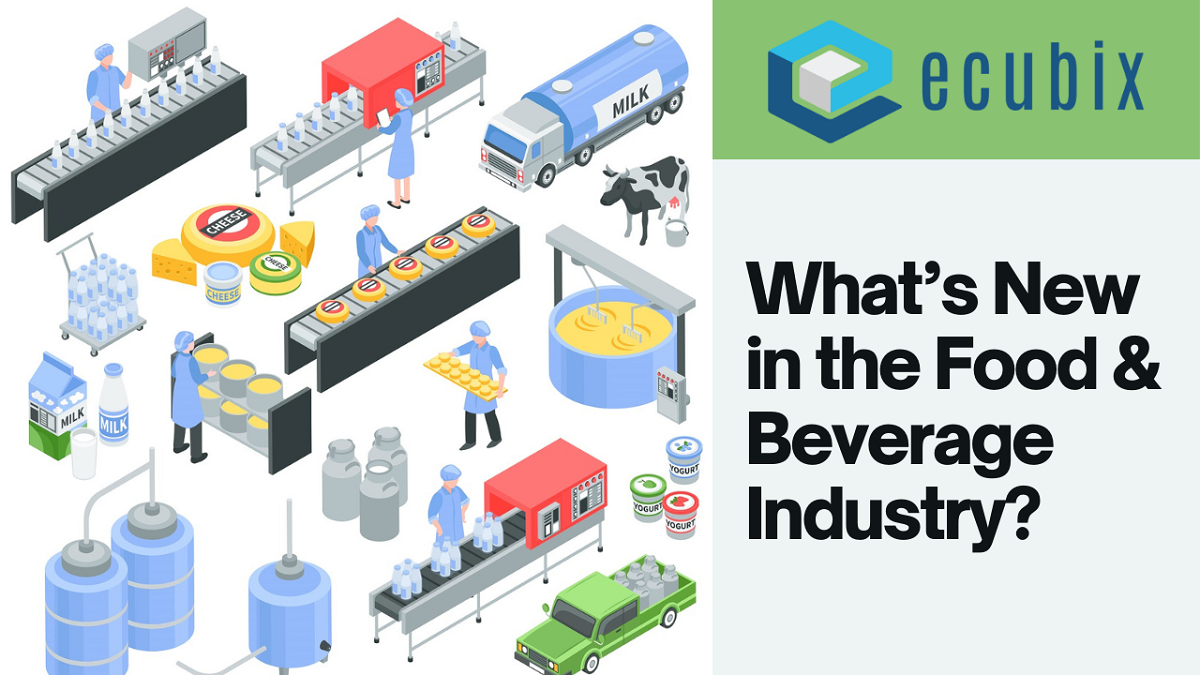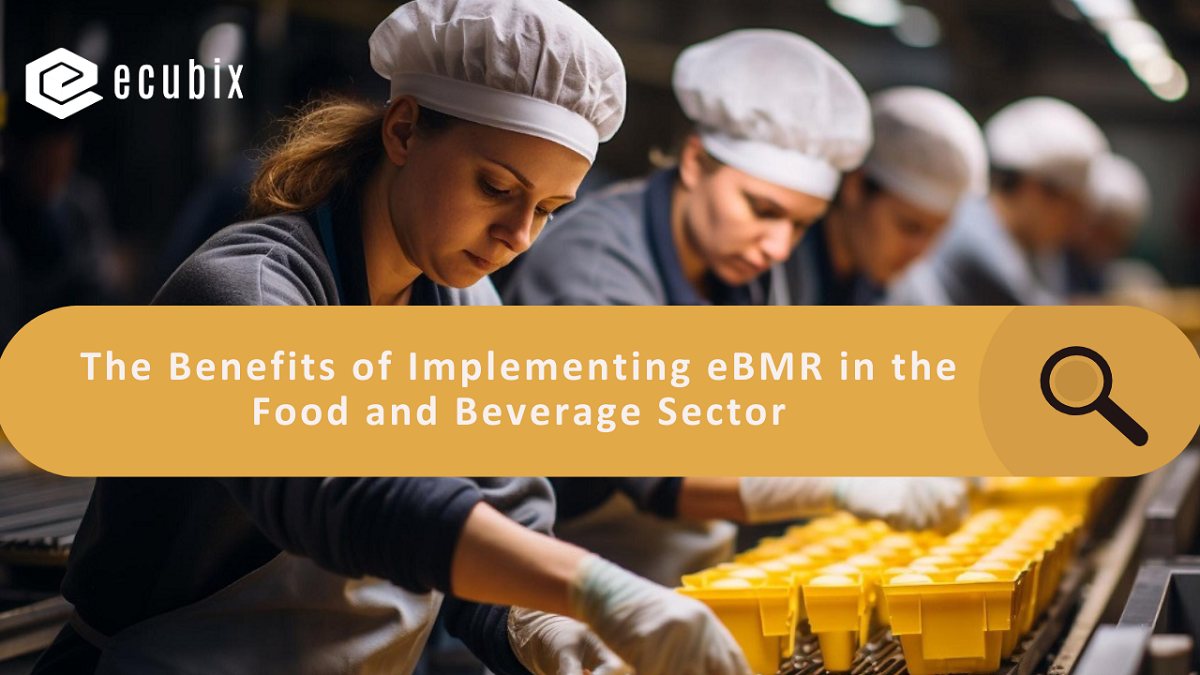In today’s modern world, technology has revolutionized various industries, including the food and beverage sector. One significant development that has brought about numerous advantages is the implementation of an Electronic Batch Manufacturing Record (eBMR) system.
What’s New in the Food and Beverage Industry?
The food and beverage (F&B) sector is a major driver of the global economy. In 2021, the global F&B market was valued at USD 7.9 trillion and is projected to reach USD 11.1 trillion by 2027. The sector is also a major employer, with over 260 million people working in the industry worldwide.
- A 2023 survey by McKinsey revealed that F&B companies using eBMR for product development reported a 17% increase in new product success rates.
- A 2022 study by IBM found that companies using eBMR experienced a 25% increase in profitability and a 20% reduction in costs.
- A recent report by PwC found that F&B companies using eBMR for marketing campaigns achieved a 30% increase in customer engagement.

- McDonald’s has used eBMR to improve its menu, optimize its pricing, and target its marketing campaigns. As a result, the company has seen a significant increase in profitability.
- Starbucks has used eBMR to personalize its customer experience, develop new products, and improve its operations. This has led to increased customer satisfaction and loyalty.
- PepsiCo has used eBMR to improve its supply chain, reduce costs, and improve the sustainability of its operations. This has resulted in significant cost savings and a more sustainable business model.
The food and beverage industry is one of the most dynamic and competitive industries in the world. In order to stay ahead of the curve, companies are constantly looking for new ways to improve their efficiency and profitability.
Benefits of Implementing eBMR in the Food and Beverage Sector
There are many potential benefits to implementing eBMR in the food and beverage sector. Some of the most significant benefits include:
(1) Enhanced Traceability and Compliance:
One of the primary advantages of utilizing an eBMR system in the food and beverage sector is the ability to achieve enhanced traceability and compliance. With traditional paper-based batch manufacturing records, tracing the origin and processing of a particular product can be a time-consuming and error-prone task. However, with an electronic system in place, every step of the manufacturing process can be digitally recorded, allowing for real-time access to crucial data. This ensures that companies can easily track and verify ingredients, production times, quality control measures, and more. Additionally, electronic records can assist in meeting regulatory requirements, such as the Food Safety Modernization Act (FSMA), by providing accurate and comprehensive documentation.
(2) Improved Product Quality and Consistency:
Implementing an eBMR system enables food and beverage companies to maintain consistent product quality. By digitizing and automating the manufacturing process, the risk of human error decreases significantly. The system can be programmed to follow standardized procedures, ensuring that each batch is produced consistently, with precise measurements and mixing times. This helps in eliminating variations often caused by manual processes. Consequently, companies can deliver high-quality products that meet or exceed customer expectations consistently.
(3) Efficiency and Time Savings:
Another significant benefit of using an eBMR system is the improvement in operational efficiency and time savings. Traditional paper-based record-keeping methods require extensive manual efforts, such as data entry, storing physical files, and retrieving information when necessary. On the other hand, with an electronic system, all manufacturing records are stored in a centralized database, accessible with a few simple clicks. This eliminates the need for physical storage space and streamlines the record-keeping process.

Additionally, the system can automate certain tasks, such as generating reports or calculating precise ingredient quantities, saving valuable time for employees. This increased efficiency allows companies to allocate their resources more effectively, ultimately leading to cost savings.
(4) Real-time Monitoring and Analytics:
By implementing an eBMR system, companies in the food and beverage sector gain real-time monitoring and analytics capabilities. This means that at any given moment, manufacturers can access up-to-date data on the production process, ingredient inventory, and equipment performance. Real-time monitoring enables swift detection of any abnormalities or deviations from standard operating procedures, allowing for immediate corrective actions. Furthermore, advanced analytics tools integrated into the eBMR system provide valuable insights into operational performance, highlighting areas for improvement and identifying potential bottlenecks. This data-driven approach empowers companies to optimize their processes, reduce waste, and maximize overall efficiency.
(5) Adaptability and Scalability:
An eBMR system offers adaptability and scalability, making it a suitable solution for businesses of all sizes in the food and beverage sector. Whether a company produces a few hundred or thousands of batches per day, the electronic system can accommodate the varying demands. As business needs evolve and production volumes increase, the eBMR system can easily scale up to handle the growing workload. This scalability ensures that manufacturers can continue to benefit from the system while expanding their operations without disruptions or significant investments in new infrastructure.
At The End: Summary
In conclusion, implementing an Electronic Batch Manufacturing Record (EBMR) system in the food and beverage sector provides numerous benefits. From enhanced traceability and compliance to improved product quality and consistency, the advantages are evident. The system promotes efficiency and time savings while enabling real-time monitoring and analytics. Furthermore, the adaptability and scalability of an eBMR system make it a valuable tool for businesses of all sizes.

The food and beverage (F&B) industry is a significant contributor to the global economy, valued at a staggering USD 8.5 trillion in 2022 and projected to reach USD 11.7 trillion by 2028. This dynamic sector employs over 350 million people worldwide, making it a vital source of livelihood.
Also Read: Everything You Need To Know About eBMR Solutions: A Detailed Guide
Mostly Asked FAQs:
What are the common challenges faced by food and beverage entrepreneurs?
Some common challenges include finding the right suppliers and distributors, managing inventory and cash flow, dealing with competition, and adhering to strict health and safety regulations. Additionally, it can be difficult to differentiate oneself in a crowded market and to build brand recognition. Finally, keeping up with changing consumer trends and preferences can also be a challenge.
What information does an eBMR contain?
An electronic batch manufacturing record (eBMR) contains detailed information about the manufacturing process of a product. It includes information such as the materials used, the manufacturing steps performed, equipment and personnel involved, testing and inspection results, and any deviations or incidents that occurred during the process. The eBMR serves as a complete and accurate record of the production process, allowing for easy tracking and analysis of data to ensure quality control and compliance with regulations.
Why do you need eBMR software?
Electronic Batch Manufacturing Record (eBMR) software is used to digitize batch records for manufacturing processes in food & beverages, pharmaceutical, biotech, and other regulated industries. It helps to streamline the manufacturing process by replacing paper-based records with electronic records. eBMR software offers real-time access to critical data, enables electronic signatures, and facilitates the review and approval of batch records. It also helps to ensure compliance with regulatory requirements and reduces the risk of errors by eliminating manual data entry. Overall, eBMR software improves efficiency, accuracy, and compliance in the manufacturing process.
What information is required to get a free demo for the eBMR solution?
To get a free demo for the electronic batch manufacturing record (eBMR) solution, you may need to provide your name, company name, email address, and a brief message about your specific needs or requirements. This will help us to tailor the demo to your specific situation and show you the features and benefits that are most relevant to you. It’s always a good idea to check with the provider for their specific requirements or process to schedule a demo.
Can I use an electronic batch manufacturing record (eBMR) solution from mobile?
Yes, you can use an electronic batch manufacturing record (eBMR) solution from a mobile device. At eCubix we have developed mobile-friendly eBMR solutions that can be accessed through a web browser on your smartphone or tablet. This allows you to manage your batch records and production processes conveniently from anywhere and at any time. However, it is important to ensure that the software is compatible with your mobile device and operating system.
